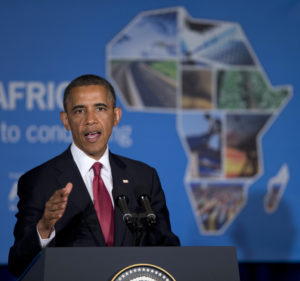
“The president so far lacks a signature achievement in Africa. Bill Clinton introduced the African Growth and Opportunity Act (AGOA), which slashed American tariffs on most goods from many sub-Saharan countries,” said The Economist. “Under George W. Bush, America dramatically ramped up aid spending, mostly targeted at HIV and AIDS programmes (sic). Under Mr. (sic) Obama, these programmes have largely been maintained. AGOA was recently renewed; America’s aid agency, USAID, is still at the forefront of HIV and AIDS prevention across Africa. But as a result of the government sequester agreed in 2011, official aid has fallen somewhat, even if private American donors such as Bill Gates give lavishly.”
Obama supporters would say the president has been preoccupied with a host of pressing domestic and international problems. And he does have a long list of accomplishments, such as passing healthcare reform, ending the war in Iraq and winding down the war in Afghanistan, restoring relations with Cuba, saving the auto industry and successfully kickstarting the American economy. However, some Africans feel Obama has neglected the continent.
“But in Africa, he hasn’t been so successful,” said Dr. Adekeye Adebajo, executive director of the Centre for Conflict Resolution in Cape Town, South Africa. “He hosted the first U.S. – Africa Leaders Summit in Washington, last August, but this was effectively a talking shop involving empty pledges. His Power Africa initiative promised electricity to 20 million Africans, but remains largely unfunded.”
Adebajo also told The Guardian Obama had continued many of George W. Bush’s anti-terrorism policies such as having 1,500 soldiers stationed in Djibouti and flying drone missions against targets in Mali and Somalia. Adebajo said American troops had taken part in operations in Libya, which had destabilized the country.
However, the Obama administration does have some successes in Africa.
“More positively, Obama has continued the generous funding of AIDS programmes in Africa, increasing the number of people receiving treatment from 1.7 million in 2008 to 6.7 million by 2013, according to figures released by the White House,” Adebajo said. “He also showed strong leadership during last year’s Ebola crisis, deploying a 3,000-strong military contingent to build emergency hospitals in Liberia.”
The Obama administration is also trying to aid the Nigerian government in its battle against Boko Haram Islamic militants, something that is easier said than done. America has refused to sell advanced weaponry to the Nigerian government, claiming it might be used to commit human rights abuses. However, Nigerian-American relations seemed to have turned a corner with the ousting of the notoriously corrupt and inefficient Goodluck Jonathan administration. New Nigerian president, Gen. (rtd.) Muhammadu Buhari seems to be developing a cordial relationship with the Obama administration, and he recently visited the White House.
“Mr. Buhari has vowed to reorganise and clean up the country’s military, which ought to make it easier to supply vetted units with intelligence, equipment and cash,” said The Economist. “Since the election, Washington has committed $5 million in new funding towards a regional military force—and more may follow. Equipment supplied is likely to be mostly non-lethal, but could include such things as night-vision goggles.”
The United States is also faced with the fact that other countries are investing heavily in Africa. In recent years, China has become a major player on the continent, developing infrastructure and building economic partnerships.
“China has replaced America as Africa’s largest single trading partner. Mr Obama’s Africa policy now largely focuses on promoting economic development and tackling Islamic extremism,” said The Economist. “China’s open wallet is making Kenya and other African countries less dependent on western investment, though they still seek it.”
Cultural issues are also complicating relations between Obama and African countries. Obama, a moderate Democrat, has supported gay-friendly legislation at home and this attitude extends to foreign relations. The Obama administration has cut aid to Uganda over its harsh anti-gay laws. A recent law passed by the Ugandan legislature made homosexuality punishable by life in prison.
Many Africans feel homosexuality is an immoral Western concept which is trying to infiltrate their conservative societies. Ugandan President Yoweri Museveni told CNN the West was trying to force its morals on Africa.
“Respect African societies and their values,” he said. “If you don’t agree, just keep quiet. Let us manage our society, then we will see. If we are wrong, we shall find out by ourselves, just the way we don’t interfere with yours.”
Adebajo said Africans should welcome Obama, but also try to get him to use his remaining time in office to pass meaningful legislation.
“In true African tradition, we should welcome Obama to his ancestral home, but in his final year in office, we must also continue to hold his feet to the fire and encourage more action, not gestures,” Adebajo said.


